the Boomerang



 Sofia Banzhoff
Sofia Banzhoff
UCU students are generally not quitters. We work hard, we’re ambitious, and we go above and beyond. And yet, some of us decide to quit. Even though in the frenzy of the first weeks here, leaving this place about which you learn new and wonderful things every day seems impossible, the first-year dropout rate is ten percent. So why do people decide to leave? Where do those lost souls go? Are they better
off after bursting the bubble once and for all? In short: are they giving up, or are they moving on?
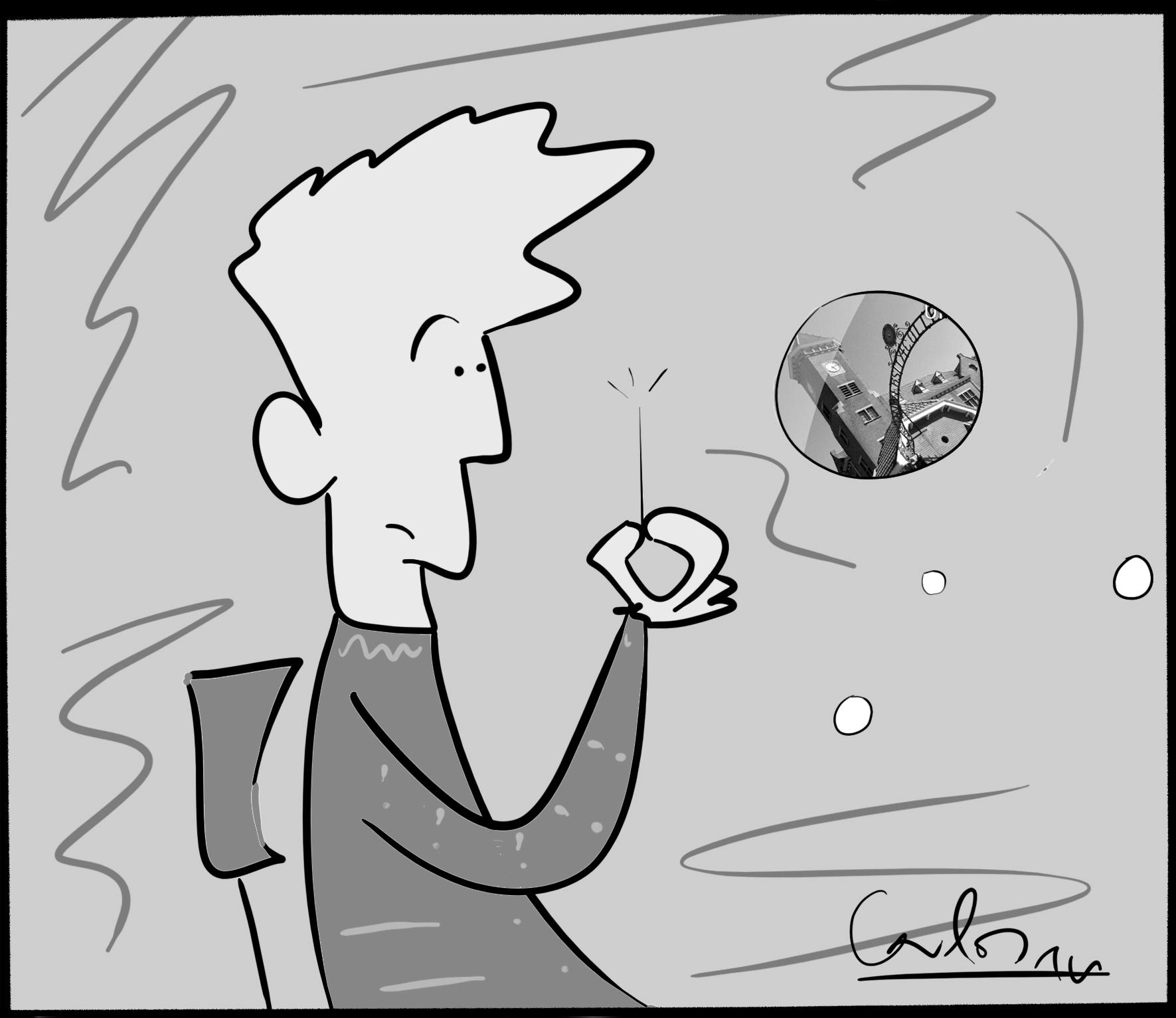
According to senior tutor Jocelyn Ballantyne, second thoughts about UCU are common, especially during the first semester. “As many as one third of the students voice doubts, which means that most likely more [students] have them.” However, very few people decide to leave, and most do so during the first three semesters.
There are many reasons for quitting. Stu-
dent life officer Mark Baldwin says these include “a realization that UCU is not the best fit for an individual’s study requirements, radical change of intention for education or career, poor health, financial difficulties and sudden change in family circumstances.” For those of us who consider leaving a viable option, there is a system for advice and guidance at UCU including the tutor, the Student Life Officer, the Dean, and the university’s wider support bodies. “It is very important that each case is dealt with on an individual basis, where the
interests of the student are prioritized,” says Baldwin.
Denise Swanborn left UCU for academic reasons. Majoring in science with tracks in biology and chemistry, she realized after her first year that UCU did not offer the right focus for her. “The biology courses here are more medically oriented, but I am also interested in other areas, like plant science or ecology,” she says.
Currently, she studies biology at the UU. “It was the right decision because now every
(Continued on page 06)
“Five tatty, sadly-coloured-in-grey tents, a big poster with a hippie-nostalgic slogan and a couple of Occupiers wandering around with a dripping nose” (check our February 2012 issue). Six months later, the Ganzenmarkt is empty –no tents, no dripping noses. Where have the Occupiers vanished?
They still hold General Assemblies every Tuesday night at 19.30 – GAs are open, if you’d like to join.
“Violence against the camp has forced us to close it down some months ago,” says a middleaged woman, Marion, during one of the GAs. “In Utrecht there are a lot of centres for homeless people and immigrants. Our camp had become a place for everybody who didn’t have anywhere else to stay.”
Despite having to abandon the most ‘hippy’ part of their demonstration, the tents, the Occupiers still stubbornly meet every week in the cold Ganzenmarkt. ‘Who are we?’ is a
(Continued on page 06)
Climate change. Water shortage. Piles of plastic that will outlive us by centuries. Being concerned about the environment is no longer frowned upon or reserved for hippies. It is chic; even H&M now sells organic cotton. Sustainability is becoming a magic word, and we are the first generation to grow up on a planet that is not considered an infinite treasure chamber anymore. But are we doing our part, or are we leaving the heavy lifting to politicians and policy makers? How does our life on campus affect the environment?
According to housemaster Maarten Diederix, students do not live in an environmentally friendly way, the biggest problem being the energy used for warm water and heating. “Most students use the same amount as a small house because windows are open with heaters on, or the heating is on 24/7, even at night or over break.” Other issues are laundry and general use of electricity. “Ten students in a unit, each doing their own washing and drying is a bad thing. We have seen a washing machine with one T-shirt in it, or computers that were turned on on August 28th and have never been turned off,” says Diederix. “These small steps times a thousand students makes it big.”
Tim Kroezen, Chair of the FacilitiesGroup, is concerned about this as well. “Our electricity costs are double or triple of what
the average student pays, which is mainly due to student misuse. We pay about €50 a month for wasted energy.” Every year the prices are raised based on last year’s expenses, so using less energy now would already lead to small financial benefits next year. These would increase with more years of closed windows and cold heaters.
Then, of course, there is the R-word: re-

One of the many riches of our beloved campus is the huge variety of committees. We hear about them as early as Introweek. We also know about the UCSA and ASC. But how much do you hear about the UCSRN – the University College Student Representatives Netherlands? And do you know who chairs the UCSRN this year?
petitive events among the colleges, such as the Inter-UC Championship, and the Dean’s Debate. In the background, it is a platform to share “experience, knowledge, contacts, and possibilities amongst UCs and… a general contact hub for external parties”, says Scholtemeijer.
cycling. Readings you only glanced at, wine bottles you don’t remember emptying, plastic wrappers you tore off of Albert Heijn products. Do they all end up in one bucket, or do you separate trash and know where the individual buckets should be emptied?
Recently, a new underground garbage disposal system was built, which will end the confusion that (new) students face. “I wanted to organize recycling in my unit, but I had no idea where and how,” says first-year Ivo Dimitrov. The Environmental Working Group promised to provide a map of recycling points on campus. Hopefully, this will end the onesize-fits-all mentality many students have when it comes to trash.
But what can individual students do? According to Marina Lazëri of the EWG, attitude is the biggest problem, because wasteful behavior only indirectly influences prices and many seem to focus on getting their money’s worth instead of saving the environment. A fallacy, since this will lead to higher payments in the future. So, do the environment and your wallet a favor and listen to Maarten Diederix: “Regulate the heating better, put on more clothes, shower less or shorter, turn off electronics on standby, and don’t put the heater on five.”
Aye, aye, Sir.
ideas and experiences, which they later incorporate into their plans on campus. So, ultimately, every student benefits.
Did we manage to get some firsthand, fresh info about the hosting location of this year’s Inter-UC Championship? Unfortunately, not –it is still a secret. Not too bad, just a reason
I’m looking for the owner of Dining Hall card 555. I owe this person four euros and an apology. I’m also looking for the responsible, critical and inventive students that UCU aims to educate – where did they go? Here’s what I did: I downloaded the first free barcode font Google gave me, chose a plausible number and printed it in Voltaire. With the code attached to the back of my highschool student ID, I went to Dining Hall. I took some food, scanned my piece of paper at the register, and the meal was mine. Turns out there is such a thing as a free lunch!
During the past few months everybody seemed to believe in protesting against the system. Regular cafeteria prices were too high for UCU students (speaking of elitist), Dining Hall forced people to be or not to be vegetarian, and depriving people of daily allyou-can-eat buffets was like a crime against humanity. Not that the alternatives were much better: making the meal plan optional, really?
I offer a box of chocolates to the first to come up with a sensible reason to pay for an entire semester if you can also pay per meal. And didn’t we all apply to UCU to live in a pseudo-America? If there’s one country where mandatory meal plans are common, it’s the US.
Founded in 2010, the UCSRN seeks to increase collaboration between the five UCs in the Netherlands (Utrecht, Middelburg, Maastricht, Amsterdam and Leiden). Each college sends representatives from their student associations and councils. For UCU, they are Martijn Scholtemeijer (UCSA), current UCSRN Chair and Linda Barry (ASC), current Academic Council Coordinator in the UCSRN.

For all students, the forum organizes com-
Once every few months, one of the colleges arranges a UC Summit, where the representatives and the rest of their boards and councils come together to discuss matters ranging from serious academic dilemmas to planning fun activities for students. It is important to keep in mind that the individual associations can overrule UCSRN decisions – it is merely a cooperative body.
But why is the UCSRN relatively unknown among students? Since it was established only two years ago, it still needs some time to consolidate its reputation. Besides, most of its responsibilities “are more for the boards of the councils and associations than for individual students”, explains Scholtemeijer. However, the platform does bring us advantages: The associations involved in the UCSRN exchange
more to look forward to the fun event. Despite remaining in the background so far, the UCSRN promises to be an interesting and useful body. Hopefully it will soon be known as such among students too.
But who still cares about the system? I just told you I ate off an innocent student! Do you know why your bank card has a pin code? Why you shouldn’t put more than twenty euros on your Chipknip? Why the protection of public transport cards is such a big deal? Why there’s a picture on your passport? Why credit card numbers are supersecret? Because only you should be able to use them!
Now think about it: what protects your Dining Hall card? Absolutely nothing! You’ve been walking over campus with a 750-euro bank note in your pocket. It’s like a bank card with the pin code written on the back. Actually, worse than that: it’s like a credit card with a guessable number. People don’t even have to steal your card to be able to abuse it. You might just be victim 555. If you should be protesting against anything, it is this. Like, right now.
Meanwhile, there is still hope for the international students who lost their Dining Hall jobs: invest a few euros in a stack of plastic cards, glue random barcodes to them and sell them to School of Economics students as Unlimited Lunch Cards. That is campaigning.
You might just be victim 555
Julie Albers
using less energy now would already lead to small financial benefits next year
the individual associations can overrule UCSRN decisions - it is merely a cooperative body
Alexandra Fergen
Lina Wenner, third semester student and a permanent feature of UCU open-mic nights, has written her first song – a ballad called “Pick you up”. UCStudios got wind of this and asked Lina to collaborate in making a music video.
The idea of making the video originally came from Marijn Maas, a UCStudios board member along with Eloi Adjavon and Erik-Jan van Kesteren. “He approached me one day and said he’d heard Lina’s song and would really like to make a music video of it. […] I was im-
mediately enthusiastic”, says Eloi, UCStudios Project Coordinator. “I think that this kind of cooperation is helpful and fruitful for both parties”.
In terms of translating the song into a video, UCStudios explained that instead of creating “a pictorial representation of the lyrics” they want to focus on the song’s calm mood. They are planning to reflect this by dividing the video into two parts: one showing Lina and the other narrating a story.
But what is the song actually about? “It is about someone I know who was in a bad place at the time. It was meant as a way of saying
Ivo Dimitrov
Who doesn’t love the annual budget General Assembly (GA)? The last gathering of the UCSA reminded us how “quickly” time flies when there is voting, budgets, and wine involved. Students might recall spending five hours of bliss in the Auditorium. As time passed and empty bottles lined up, a heated discussion arose among different committees and the UCSA board. All tensions didn’t seem resolved with the end of the GA, which prompted the Boomerang to investigate the ever-controversial budgeting issue.
SportsCo was one of the most vocal committees, especially regarding the budget for the newly-formed female football team. The UCSA policy to only sponsor sports teams that officially represent UCU in competitions resulted in the team not receiving funding. “I understand the policy. Our reason for bringing this up at the GA was ExtremeCo, which
doesn’t do anything to promote UCU and still gets quite a lot of money,” Head of the female team, Tessa van Rens, said. “I still believe female football serves a big purpose on campus and thus should be funded.” The team’s disappointment is obvious, but Tessa feels she has sorted everything out with the UCSA and accepts their decision.
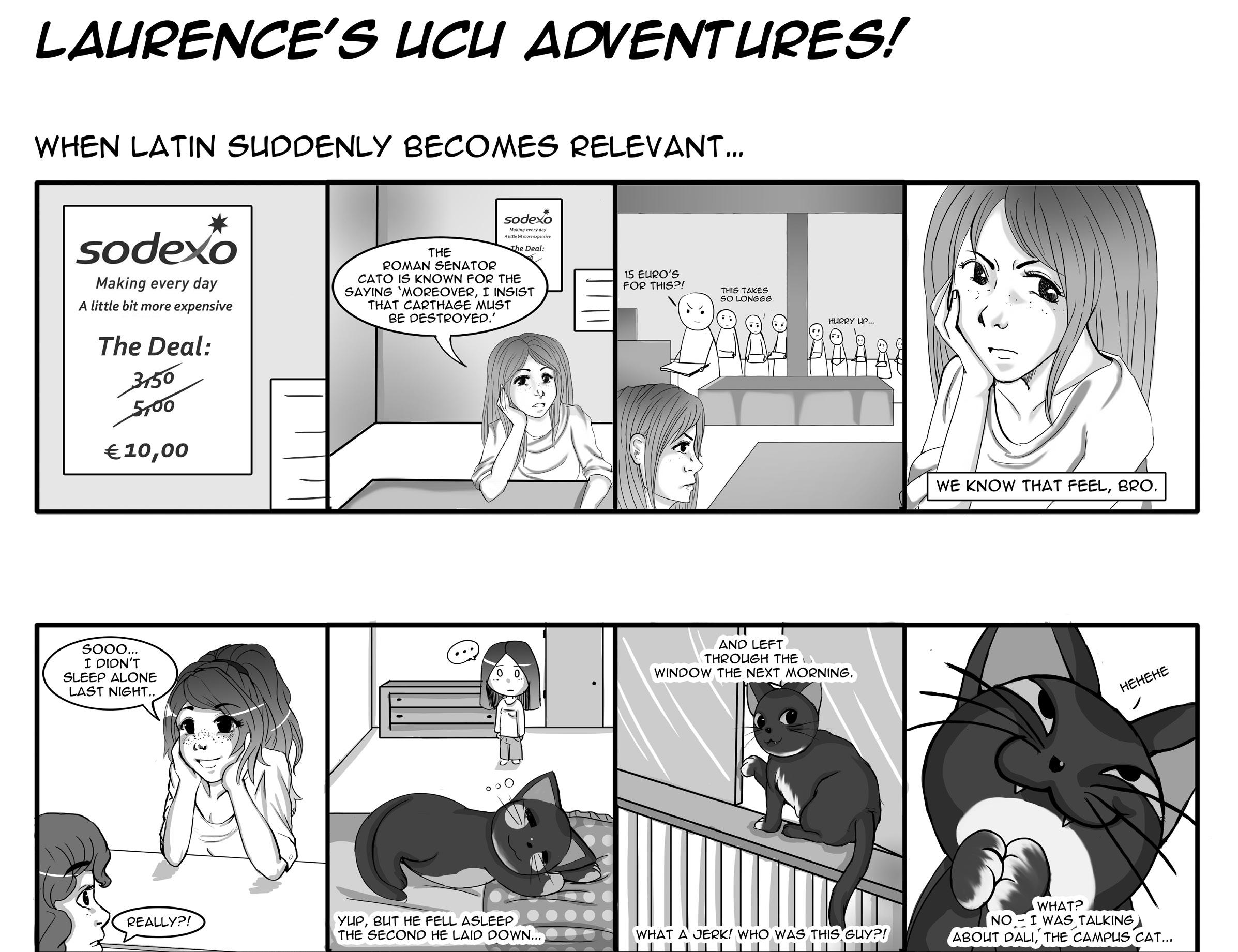
But how does such understanding attitude correspond to the bitter accusations and heated exchanges from the GA? UCSA Treasurer Nina de Gruijter feels that this behavior is normal. “Committees are satisfied with their budgets, but once they see what other committees receive, they suddenly do not agree anymore, which is a pity. At the same time, it is important that these issues are brought up. Otherwise their frustrations would just bottle up.” She also stresses that she stands behind the budget, but is always prepared to talk about it and look for solutions.
It might seem that conflicts are settled, but the sour taste from the GA is apparent when committees discuss their frustrations. For
that she had a support network and would get through this difficult time”, says Lina. “I’m really excited that there are people who want to spend their free time on a song that I have written.”
Indeed, engaging in such a time-consuming project alongside studies and work can be challenging. The group’s enthusiasm proves to be a driving force. “We’re currently nearing the end of the pre-production phase and once we’re finished with that, we’ll jump into shooting. Inshallah, sooner than later,” says Eloi optimistically. We are eagerly waiting.
This year’s first GA approved the UCSA budget in an exceptionally long session, but how much do we know about the UCSA Board’s motivations behind it? A few rumours about this are circulating campus.
example, the MarathonCo board still senses certain unfairness towards Sports committees. Treasurer Wouter den Hollander remarks: “We are a student association, not College Hall. It’s strange that academics are seen as more important within the UCSA. People should not get more money for MUN than for doing sports.”
The MUNCo board on the other hand, stresses the fact that MUNCo is giving everyone an equal chance to participate in MUNs. “Although it’s expensive, it benefits students in many ways and gives them many valuable skills,” Treasurer Joost Meulendijks said. Perhaps, committees with big budgets will always spark controversy during GAs and cause minor frustrations and divided opinions. Naturally also, boards will use the opportunities to have their voices heard. But then again, aren’t we making a lot of fuss about nothing? Little has changed a month after the heated GA discussions. All we have left are hazy memories of a Monday night that went on way too long.
Even though we all agree on how professional looking the new website is, most students think €4,000 is a lot of money to brush up the old one. What seems to sting most is that no one consulted the students. Granted, according to the Policy Manual the Treasurer does not have to ask for permission and only has to ‘notify’ the student body through email or at the GA when he or she spends more than €2,500. However, returning to campus to find out that the UCSA just spent a few thousand Euros on a new website creates a feeling that things have been decided over our heads. The point is not that many of us would strongly disagree with the expenditure, but that it was not put across beforehand. This lack of communication is an interesting paradox, because one of the aims of the website is to improve transparency and approachability.
Another criticism heard through the grapevine is that the UCSA had to cut their budget because they failed to request a College Hall subsidy on time. Again, it was unclear to many students why the subsidy was cut down. Treasurer Nina de Gruijter explains that “College Hall sometimes listens to rumours and they thought we had a lot of savings, which is why they decided to cut on our subsidy.” Probably, if College Hall had received more information, they would have known the UCSA really needs the money.
Judgments on the Board’s performance are easily made. However, has the UCSA Board really done such a bad job on these issues?
According to Nina, the hired website builders were not only the best, but also the cheapest offer. As UC alumni, they knew what the ‘feeling of the website’ should be and were willing to give the UCSA a discount. Most board members had mentioned a new website in their election statements in order to improve transparency and clarity, so somehow, this expenditure was to be expected. Besides, because the website building had to be done in summer, the only possibility was to inform the student body afterwards, during the fall semester.
And the subsidy? Thanks to unclarity from both sides, we now receive €5,000 less from College Hall than we did before. Surprisingly though, according to Nina, this Board is handing over a balance sheet to College Hall whereas previous boards did not. So after all, it looks like the present UCSA board is actually coping quite well with financial challenges.
Last semester UCU students and staff circulated on Facebook a link to a fundraising campaign raising money for the study costs of a young Kenyan woman. Awarded a full UCU scholarship, she was halfway to reaching her dream of becoming a UCU student. Several thousand euros were still missing. After months of tough fight, suspense and many ups and downs, Benedetta Mwongeli (Bena) has proudly joined the class of 2015.
A few minutes into talking to Bena and you can already feel she is a smart person with a remarkably calm and positive disposition. You might spot her in your Intro to Anthropology classes, or in Dining Hall where she often sits with a different group as she likes chatting with new people. For two months now, Bena has been adjusting to the new environment, combating academic challenges and befriending people from and outside campus.
Born in a Nairobi slum, Bena grew up witnessing the severe problems of her community and was personally affected.
“Once, I lost seven of my friends in one year. It was a very, very hard year for me.” Upon completing Polytechnic high school in another city, Bena returned to her slum determined to take action in helping her community in one way or another.
Community service involvement wasn’t easy. In setting up projects she had to struggle against corruption and local attempts to sabotage her work. Still, Bena came out as a winner. She motivated a group of friends to help her and founded her own community NGO. For years now, they have been supporting children with school, giving them also a chance to socialize and develop their talents. “Initially we started with seven people and now we have a total of seventy [members] including the kids,” says Bena.
Bena’s NGO, Mukuru Talent Development, is one of the organizations providing internships for participants in the UCU in Africa program. This is how she heard about UCU. Former UCU professor and founder of the UCU in Africa program, Dr. Caroline Archambault has helped Bena a lot.
Two UCU alumnae, currently working in her organization, have prepared Bena mentally about the UCU challenges and what to expect here. “The only thing that surprised me
was the bikes,” says Bena laughingly. “They are so many!”
She likes her classes, but mostly struggles with essay writing. Usual advice she gets is to ask questions, but she feels lost on that. “If I don’t know that a key (serves) for opening a door, I cannot ask is this key for this door,” says Bena. But she certainly has grasped the situation well and seems very determined to improve.
Socially, Bena, 28-year-old and a mother of two, has not only managed to fit in well in our community, but she already has many good friends. She says she is not the person to have one close friend. “Many students here are very young and suffocating somebody with all your problems can be annoying,” says Bena. “Sometimes, I need an adult to talk to and then I go to Lonia or friends from outside (campus)”.
For the near future, she only has two plans: to study hard and to find a job. She misses her real family and her family at the organization a lot. Yet, Bena seems to have gained a real UCU mindset: “For the moment, I have to focus on my education,” she says.
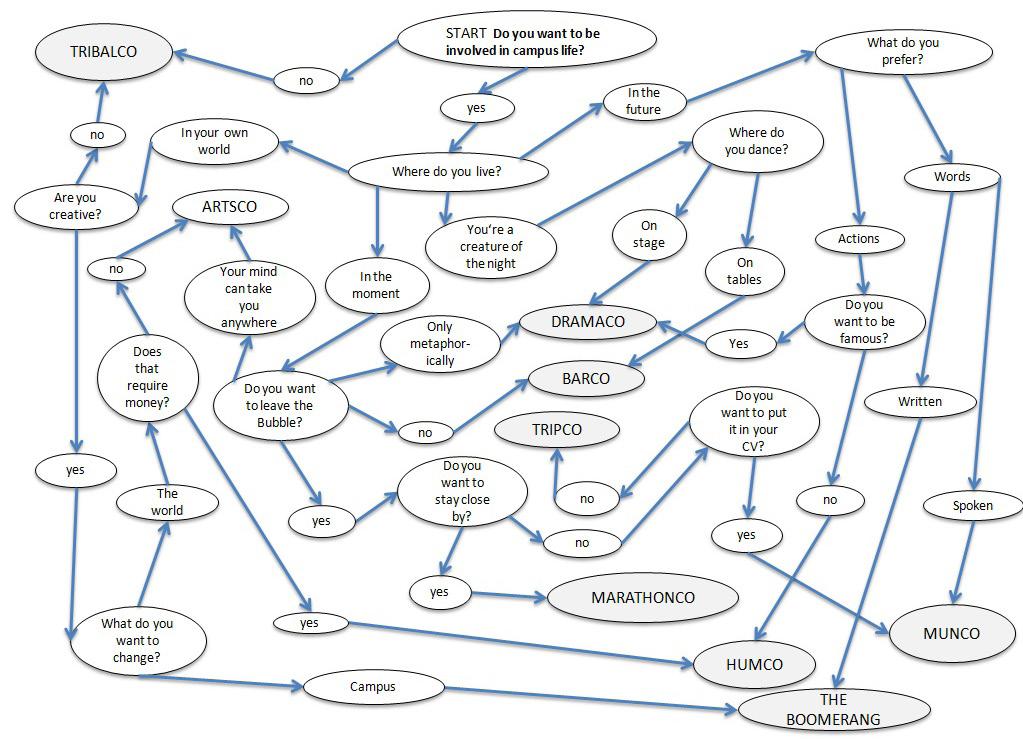 Sofia Banzhoff, Katharina Luckner and Willem van Geel
Sofia Banzhoff, Katharina Luckner and Willem van Geel
If you are reading this, you survived midterms and midterm break, which (un)fortunately also means that half of the semester is over. Even those of us who are comparatively new here have truly arrived by now, campus is less of a mystery, and there are even some traces of a routine to be found. The dust has settled, and maybe you remember all the committees you signed up for a lifetime ago, during Introweek. Those emails crowding your inbox, those infoborrels you went to. But now you’re not sure to which committee you should truly dedicate yourself, since, at UCU, having only twenty-four hours in a day sometimes feels like a cruel joke. You’re in luck. We’ll help you narrow down your choices.
Are you a creative spirit who will find inspiration in ArtsCo and the like? A political mastermind who could practice for world domination in MUNCo? Maybe you’re the aspiring member of the fourth estate all future politicians should look out for, lest they want to read about their (wrong) doings in the Boomerang? Or is endurance your thing? If this quality is mostly found in your lungs and muscles, join MarathonCo and train for the holy grail of running; but if you have an uncharacteristically resilient liver, dedicate your student life to BarCo. Take our quiz and find your perfect fit!
Whilst he is still relatively unknown in the international fashion world, Jan Taminiau is emerging as one of Holland’s top designers, with his imaginative creations being worn by a variety of different people, including Princess Maxima and Lady Gaga. After completing a master’s at the Fashion Institute of Arnhem and undertaking various traineeships at the corsetieres of Dior and Yves Saint Laurent, Taminiau decided to launch his own label, JANTAMINIAU. Two years later Taminiau showed his collection during Paris Fashion Week, one of the biggest events in the fashion calendar, and from 2007 onwards he has shown his couture collection there twice a year. I first came across Jan Taminiau whilst procrastinating and reading blogs, allowing me to daydream
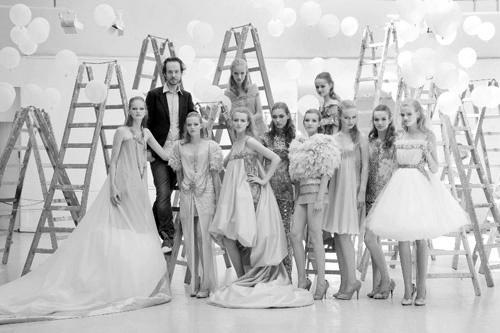
about the next pair of shoes I would buy instead of studying Mussolini and matrices. I was in awe of his work and very surprised when I found out that his atelier was in Naarden, a mere 10-minute bike ride from where I lived. I had no plans to work in the fashion industry, and had never sewed before in my life, but thought it would be an interesting experience to see how the industry worked, and to see what a designer’s atelier was like, and so I decided to apply.
A few weeks later I received an email with an offer for a 3-day trial at their atelier, which I accepted. I turned up at 9am sharp, only to find the place totally deserted. Twenty minutes later, a slightly dishevelled man showed up, introduced himself as the manager and welcomed me to the atelier. I was very surprised at how relaxed everything seemed so far, as the fashion industry is normally thought of as uptight, although the atelier itself was less surprising. It was modern and stylish, with inspiration boards and bits of fabric everywhere. The other workers were a mix of experienced seamstresses and younger girls who were there for secondary school work. The work itself was fiddly and quite tedious (I spent most of my three days creating tiny flowers out of sequins and beads) but the environment of the atelier and my co-
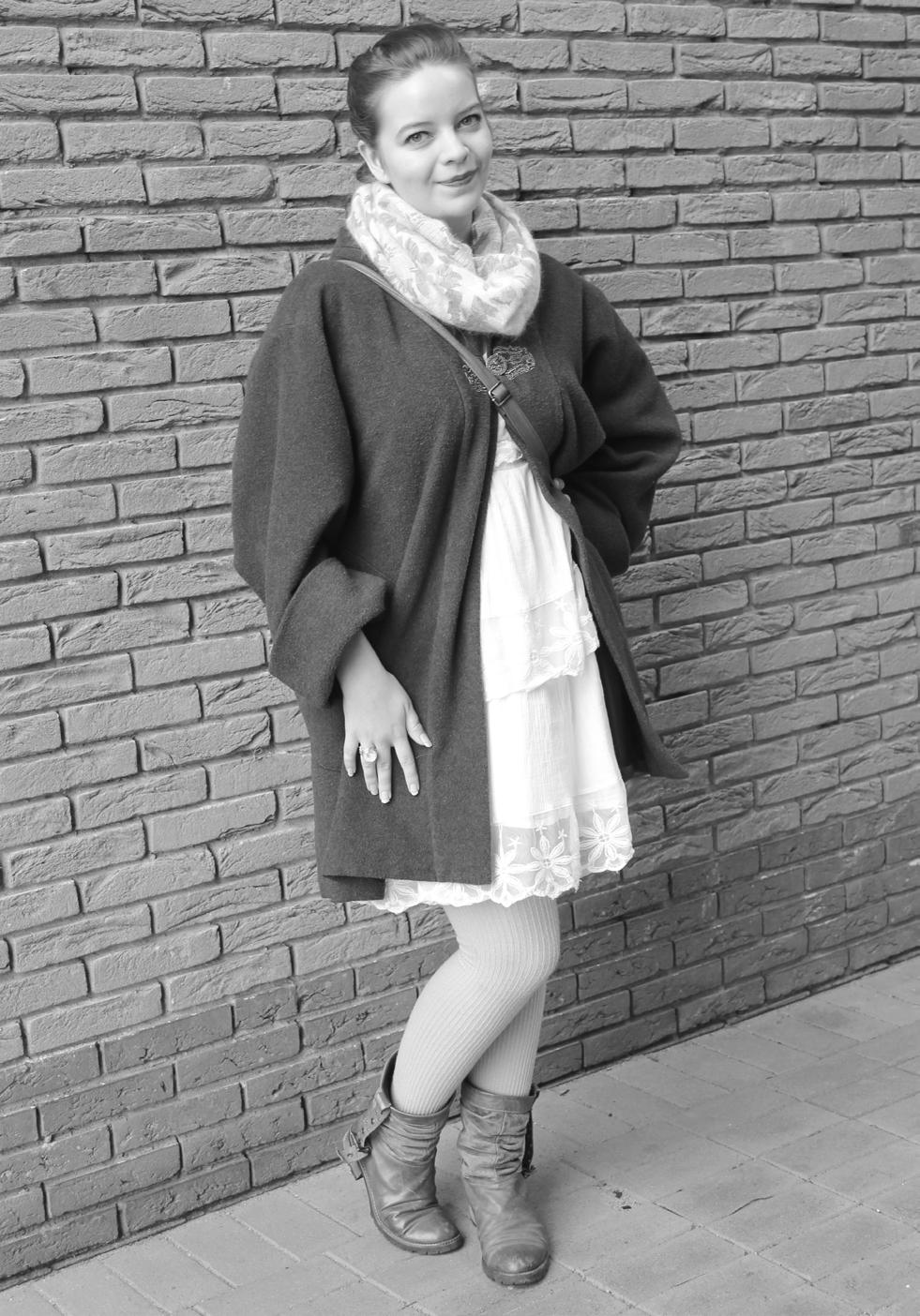
workers make the work a lot more interesting. Whilst working, the co-workers would gossip about their love lives, and one lady in particular was very keen on sharing torrid details of her latest affair with a married man. The arrival of a pair of custom-designed heels for Lady Gaga also resulted in lots of excited chatter and squealing. It seemed I had intruded a weekly coffee meeting rather than working in a high-end designer atelier, not something I had expected from the fashion industry. But there was also work to be done, and when they weren’t gossiping, they would be talking about how the pieces were coming along and the fast-approaching deadlines. It seemed there was still a lot to be done, and even Taminiau’s family came in during the weekend to help out.
After the three trial days, the atelier manager offered me an unpaid internship for three months, which I decided to decline because as a student I was probably better off finding a paid job. However, the three day trial gave me a unique insight into a world of design, and witnessing just how much time and effort goes in to creating these beautiful couture gowns has given me a new appreciation for work that it is too easily dismissed. More importantly, it often seems that the fashion world is unreachable, and there is the idea that people who work in the fashion industry can be aloof, arrogant and elitist. But my time at the atelier showed me that perhaps not all aspects of the fashion industry match up to their stereotypes, and that the industry is perhaps a lot more accessible than it seems. Sometimes all you have to do is send that email.
We asked some of our fellow students to 1) describe their style in one word and 2) where they bought the outfit worn in the photo.
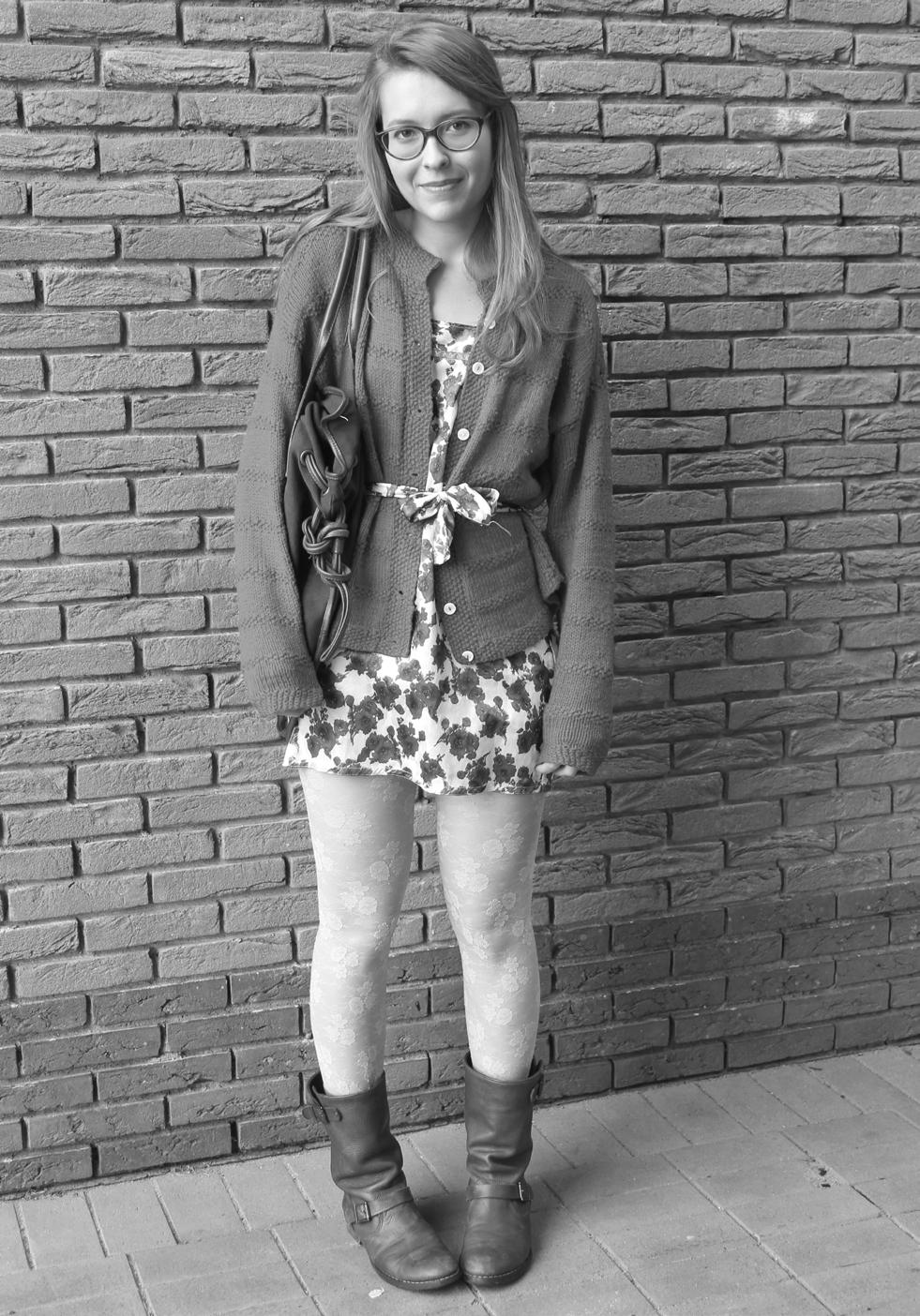
1.Playfully elegant 2.My dress is from H&M, as is the scarf. My coat, however, I got from a small curiosa shop in Bayeux (France) that was having a sale because the old woman running it had to retire. The tights are actually from the swapshop event at UCU. My boots are from peppermint and my ring is from Noona. I try to think about my outfit as a whole so shoes or accessories matter as well.
2.My shoes are from Zara in Spain. My jeans are from Bershka in Spain and it has suspenders, which is always a good thing. The tanktop is from the H&M in as it was very warm in Spain and I needed something that would not make me feel so warm. The lumberjack-shirt is from Episode in Amsterdam, before Episode was mainstream and in Utrecht. I like the coloring, the fabric and that it’s nicely oversized. It’s about as comfortable as one of those bad sweaters (like the ones saying UCU), yet it does not look as bad/sad.
2.The bag is Marc O’Polo, it’s the perfect bag and has a lot of space for losing your phone and keys, and I’ve been carrying it around for years now. The cardigan I’m wearing was knitted by my grandmother when I was around 7 years old, and the dress I’m wearing is homemade. My tights are from H&M and the red leather boots from some store in my hometown. The ring I’m wearing was my grandmother’s, my glasses are vintage Antonio de Miro.
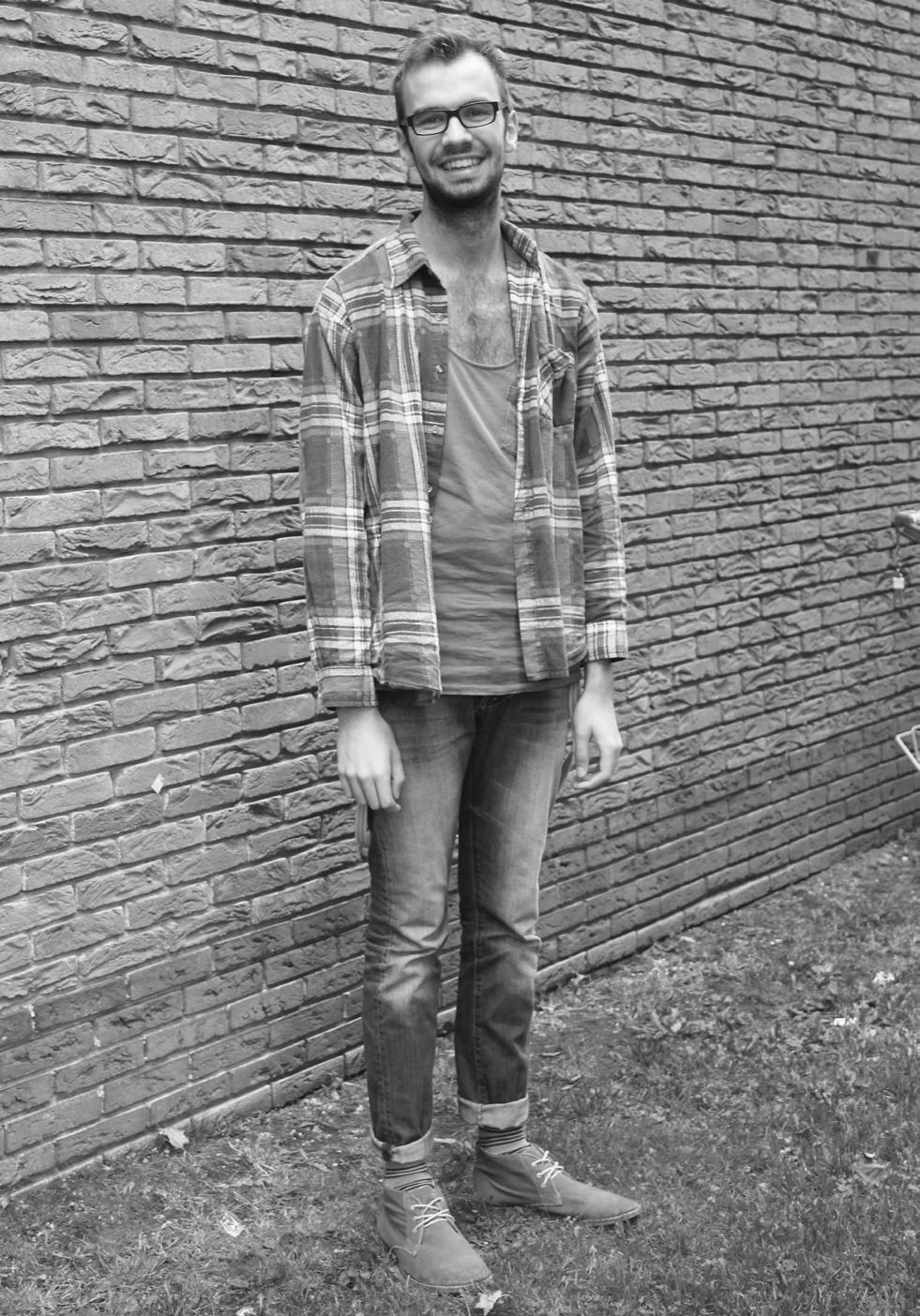
thing I learn is what appeals to me and what I want to continue in.” Was spending a year here a waste of time? Not for Denise. “I learned a lot, both academically and about myself, and found out what I really want to study.” The decision to leave or stay for her de-
ally felt like home to me, and I’ve lived in other places for only two months and felt good. It was the atmosphere or something,” she says. She mostly disliked “the attitude of “we’re living in the bubble, this is our world.” The term “bubble” never appealed to her either. “I don’t
pends on whether you know what you want to study. For people who want to focus on only one discipline, there is limited number of courses. “UC is a really nice place, but some people just fit better than others,” says Denise.
Other people leave because of the nature of campus life, like one student who left after her first two months at UCU. “Campus never re-
understand why people want to live in a bubble.”
Academically, everything was fine and a double major would probably have been easier to organize here than in Leiden, where she is now pursuing two bachelors’ degrees. “I didn’t want to take the risk of feeling unhappy for three years. I don’t regret starting at UCU
question they still ask themselves.
One of the most debated issues is the image that Occupy should present. “We should strive to be a direct democracy movement, not a protest one,” says Pieter Jan, a chatty student who tends to take the lead of the group. “People in the Netherlands are different from people in Spain or in the US; here we need to be constructive, not only deconstructive. And we might need to consider working with the government, rather than against it.”
rupts; there is no shouting or making fun of what others are saying. What seems to prevail is the so-called ‘bridge ethics’: “I try to find a middle way, creating a bridge between you two,” says Marion, attempting to mediate between Pieter Jan and Bram.
True, listening to everybody may cost a lot of time – for example, a half hour discussion about whether, given the cold temperature, it was better to keep the assembly outside or to move it inside. In the meantime, everyone was
Not everybody, however, shares this position. “This movement was born as a protest, protest must remain our front line,” says Bram, also interviewed for the Boomerang last year. “If we all do something different [from the other Occupy movements around the world] we risk fragmentation, and we cannot afford this.”
However, even in the case of these disagreements the members respectfully listen to each other. No one inter-
freezing.
However, the ‘bridge ethics’ also ensures that everybody feels accepted and can immediately integrate into the group. No bureaucracies, no feeling of exclusion, no need for formal acceptance into the group. As soon as you sit down with them, on the benches of the Ganzenmarkt, you’re part of the Occupiers. And your opinions are welcomed, encouraged, and valued just like everybody else’s.
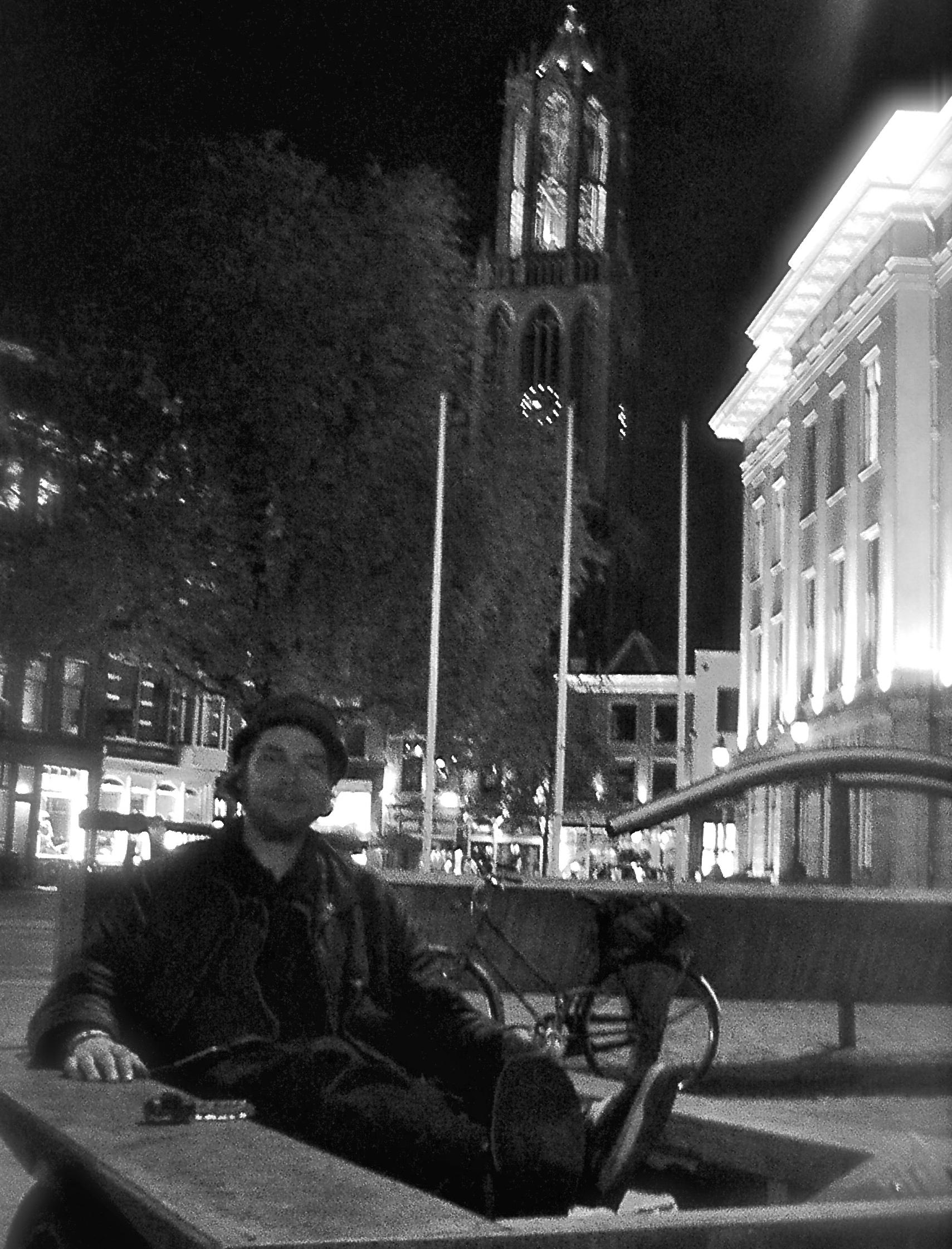
because if I hadn’t, I would have always wondered whether I’d made a mistake or not. The only thing I miss is waking up five minutes before class and still making it on time.”
Second-year Carlos Granados Martínez is one of the people who had doubts but decided to stay. UCU was not how he had imagined university to be. “I expected uni to be more than academics,” he says. Even extracurricular activities are largely academically focused, where committees such as DebateCo or PoliticsCo are more popular than, for example, ArtsCo. “There is a gap in promoting creativ-
ity on campus.” Another reason was the fact that from his graduating class in the United States, he was the only one to go to a European university. “I felt a bit isolated and thought that I had made a mistake by coming here.” But he decided to finish what he started: “My philosophy is: Never let the weather determine the man.” When asked if he ever wonders what would have happened if he’d decided to leave, he says: “I think “what ifs” are the ASAPs of life: you can take them, but they’re pretty much useless.”
‘what ifs’ are the ASAPs of life: you can take them, but they’re pretty much useless I didn’t want to take the risk of feeling unhappy for three years
Seven paintings by renowned artists such as Picasso and Matisse were gracefully stolen from the Kunsthal Museum in Rotterdam on 16 October, thrusting the open and flexible architectural design of this temple of art to another level. The absence of the museum interns at the time, combined with their weak alibi - “we were working on our thesis proposal”- initially sparked suspicion, but it was the security staff that soon came into the spotlight. The three beings – the blurriness of the security tape can only be explained through cubist lenses – accessed the installation with remarkable easiness. They managed by simply opening the back door and consequently jeopardized the professionalism of the security personnel, then accused of being involved. However, the Kunsthal Museum defends the innocence of its personnel and draws on past events in emphasizing how easily fingers are pointed in the aftermath of art crimes.
On another note, the Tate Museum, previous host of some of the stolen paintings, has very successfully used the crisis to present itself as a better place for exhibitions by openly stating its ‘sympathy for the Kunsthal’.
Creativity surrounds art, even when the latter is stolen. We can easily corroborate this by analyzing the vast range of potential explanations for this crime. There are stories of every color – from my personal favorite, an eccentric millionaire who plans the devious scheme in order to put the masterpieces in a crypt inside his mansion, to the official, dull one given by the Politie featuring the thieves hiding somewhere and waiting for the museum to close. Besides the cultivated manners of the Dutch department, this latter interpretation shows us how the current investigations are ignoring the fact that the security tape shows the thieves entering the museum from the outside.
Owner of the artworks, the Triton Foundation, showed their discontent when the news arrived at their rowing borrel. Jokes aside, information on this foundation is very scarce and how the members effectively avoid any public appearance adds to the Hollywood flare behind the story. Similar cases indicate how the paintings might be successfully traced within a span of three years; the only thing left is to hope the artworks aren’t ruined.
The story at least illuminates a different career prospect for the Museum Studies crew.
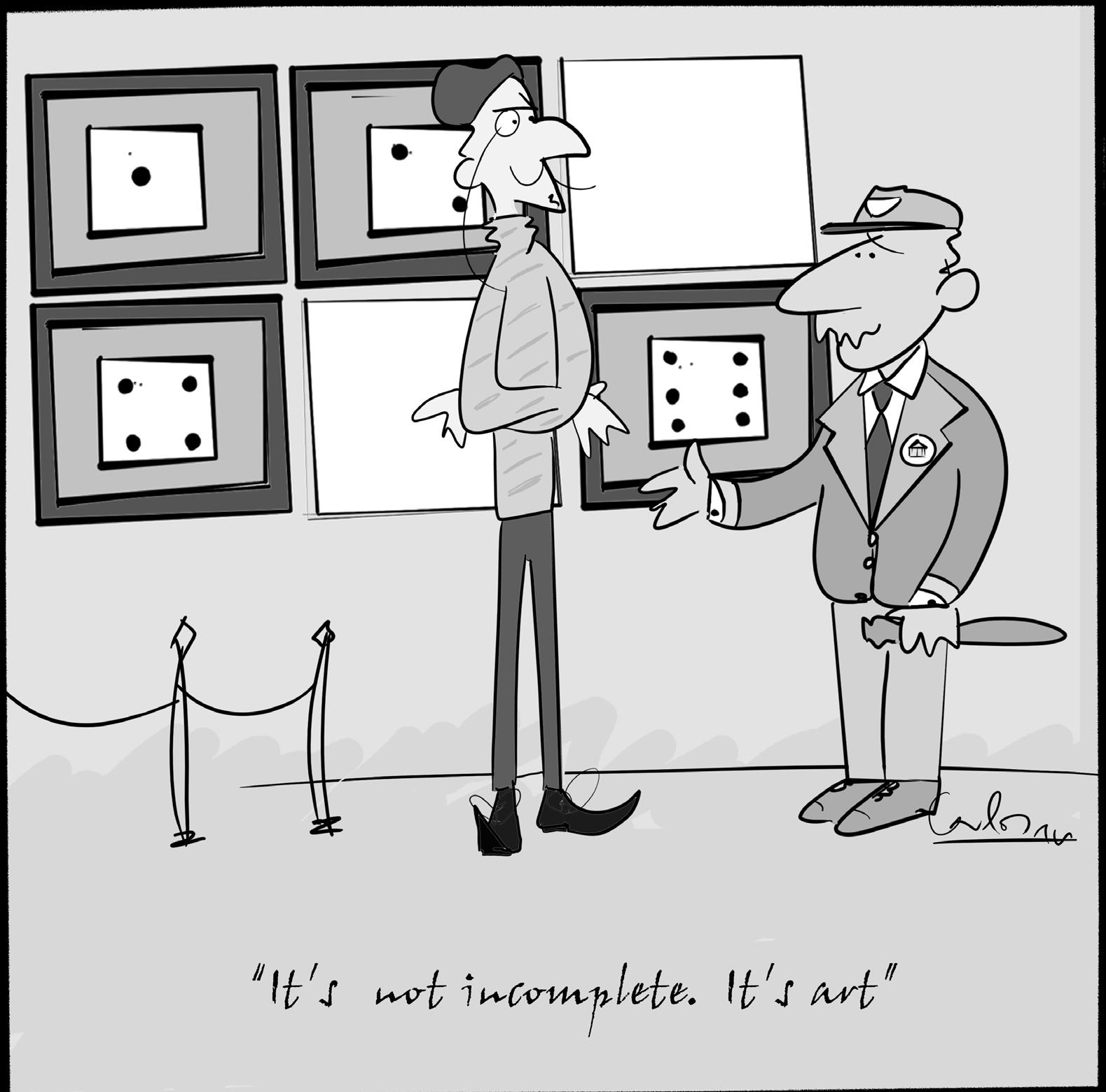
“Who exactly makes up the European troika?” Last week, this question was asked in the Dutch TV-show “In search for a Prime Minister”. The wouldbe-PM was not able to answer it. Are you? I would hope the actual Netherlands’ PM can. And seeing how we’ve been struggling for almost five years now, let’s hope our next PM can.
In the wake of the Euro crisis, any leader in the Eurozone suddenly has to be a simultaneous expert on European law, specialist in macroeconomics and a financial systems geek. On top of that, he’d better understand the psychology behind nocturnal Brussels negotiations and the math behind the ESM’s billions. In fact, it might seem absurd, but the truth is that when the twenty-seven EU Heads of State met up last week in Brussels, only a handful were brainy enough to get involved with the extremely technical legislation being discussed. The others simply sat and stared with glazed eyes, played with their smartphone or burned the midnight oil having little dialogues about this and that with their advisors.
Where to find such an all-knowing superman? Well, If anywhere, maybe we could find him (or her) at UCU. If at any university, and if at all, students obtain interdisciplinary excellence, aren’t we then trained to understand the complex mechanisms of European law, to master the Machiavellian machineries of international relations, and to grasp the European economy in its global context? Ask us and we’ll tell you which way to go forward. But then again – why is it that at UCU where many law courses are offered, European Union Law only comes at a three hundred level? And why does the professor then need to take out eight weeks for a moot court about the legality of the ESM treaty? So far, not a single student has been able to devote their thesis paper to offering a solution to any of the financial aspect of the current chaos. If UCU’s law students need to work through three 7.5 ECTS courses before getting the faintest technical clue what Europe is currently up to, then what should the average voter think? Last summer, when taking driving lessons, I asked my instructor what his thoughts were of the current PM. He indifferently remarked: “That’s that Harry Potter guy with the glasses, right, Balkenende?”.
Now, he may not have been the average voter, but if a driving instructor already has trouble thinking up who leads the country nowadays, he will probably not know about a foreign policy issue like the current Euro crisis, let alone what led to it. And forget about a sensible contribution to actually solving the problem. Europe is difficult and technocratic. No wonder even the Brussels bureaucrats aren’t able to put an end to the current chaos.
The bubble at UCU is rarely penetrated. Other than the odd European monetary crisis, we live in a relative seclusion. We study, suffer under the tyranny of Sodexo and drink away our sorrows in the bar, week after week. However, if there is anything from outside of Europe that has breached the iron gates of our humble school, it is the debate over the question posed to the citizens of the United States of America.
So, will it be the black dude or the Mormon with the hair?
There are a number of Americans and American-culture kids like myself floating around, and everyone happily provides their own doomsday scenario. I know I have, as a staunch Obama supporter and dedicated Daily Show viewer. At this time I’d like to attempt to provide a more objective depiction of the issues at hand.
This election is about the spirit of the nation, a nation divided between red and blue. The Red and the Blue, the Asses and Elephants, spineless Democrats and zealous Republicans; these are the two sides of the American political spectrum. Each has chosen its champion, and in the next four years only one of them will lead the nation. Now, things are not well on the State side of things: the economy is a dump, conflict abroad drains the nation and 7.8% of Americans don’t have jobs. Who can solve it?
The Republicans have put forward a man who suits them. Mitt Romney – a millionaire who gained his experience through business, a real market made man. He and his party swear by the theory of the trickle-down economics:
the rich ‘job creators’ must be given space so that they will invest in the nation and wealth will reach all corners of society. Eventually. This is paired with a belief that beautiful, pristine capitalism and free market healthcare will heal the sick and mend the broken.
The Democrats still stand by their pillar of strength, Barack Obama. Though they, once again, did not manage to get some of their legislature approved when they held a majority in the Congress, they still believe that it is with their leader that the US will be set right. The Democrats come as close to the European system of social democracy as the extreme conservatives will allow (before they all scream SOCIALISTS!) and see the way out of the recession as everyone paying their fair share to promote growth. Obama has managed to reform healthcare and help the uninsured. Now, neither party is perfect and populism encroaches on a lot of what either candidate says in speeches and huge-budget events. But, at the end of the day, the States are confronted with a choice that Europe has not had to deal with for a long time. The concept of a nationalized option in healthcare was enough to bring up a nationwide debate. Citizens of the Netherlands have no worries about healthcare. My barber in LA, on the other hand, has to hope she doesn’t break her arm, which would keep her from work. If there is such a thing as an evolutionary stepladder that all societies must ascend, then Europe is a step above the Home of the Free. The US is now faced with the question of whether or not to climb. Social democracy is not perfect, but it certainly is a step up from the situation in the States.
I just hope that enough Americans have the sense to agree.
“Europe is difficult and technocratic”
Robert van Schaik
It already feels like such a long time ago: Getting off the plane at Schiphol and walking to the train station empty handed, since my bags had somehow ended up in Texas. I quickly familiarized myself with the public transport system of Holland, and finally found UCU after nearly missing my stop. I was a stranger to this country, where everyone speaks English - with a funny accent - and normal things like peanut butter become peanut cheese. One of the first words I learned in Dutch was ‘gezellig’, which looks nothing like how it is pronounced, but is very appropriate, because I cannot think of a better word to describe the people I have met here. UCU is an incredible community that does everything together, from freaking out over midterms, to partying in the bar and hating Sodexo.
I decided to study abroad because I was burnt out and tired of the same old routine. It was time for a breath of fresh air, and although the weather is pretty awful, I must admit the air here is quite fresh. This is a completely different world, with bikes everywhere. Although I do miss the convenience of driving, biking is a nice change of pace, and you exercise too! This is also a time of self-discovery. I found that I love
Improv, but that debating is not my thing. The committees are fantastic since they are open to everyone, and I highly recommend that you try everything at least once; you never know when you unexpectedly discover something you love!
Hitchhiking with TripCo was one of the most amazing experiences I have ever had, traveling through Europe, meeting all kinds of people along the way, and finally ending up in a beautiful city. Then when you have arrived, getting lost with your friends, learning about the history and, of course, enjoying the night life!
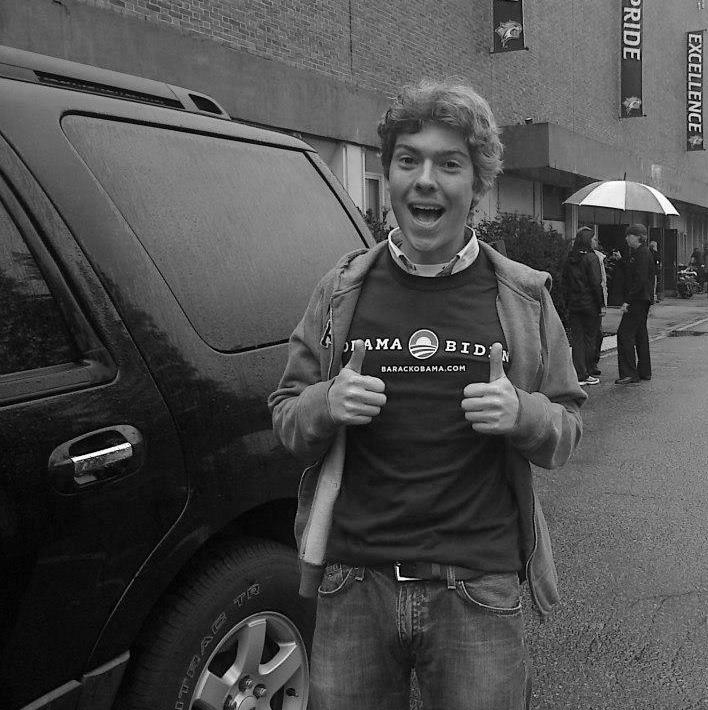
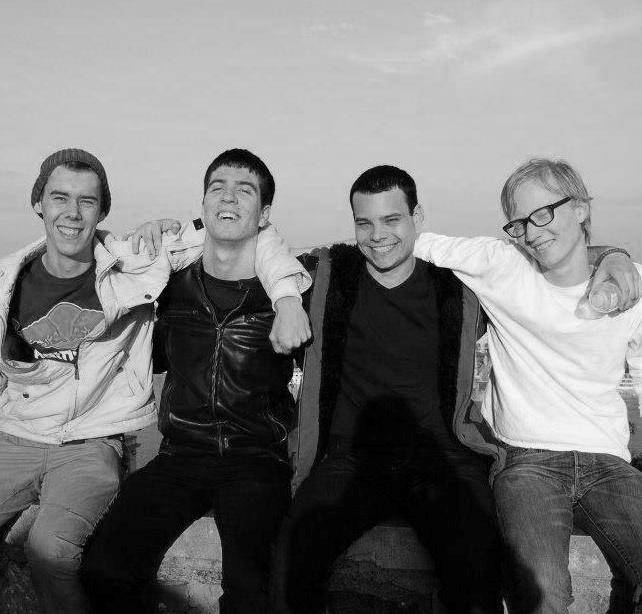
It has only been two months, but it feels like so much longer. These have been, without a doubt, some of the best months of my life, and although I wish I could extend my stay, I will be graduating at the end of this semester. All good things must come to an end, but if there is one thing I have learned while staying here, it is that one semester just isn’t enough. So watch out Utrecht: I’ll be back
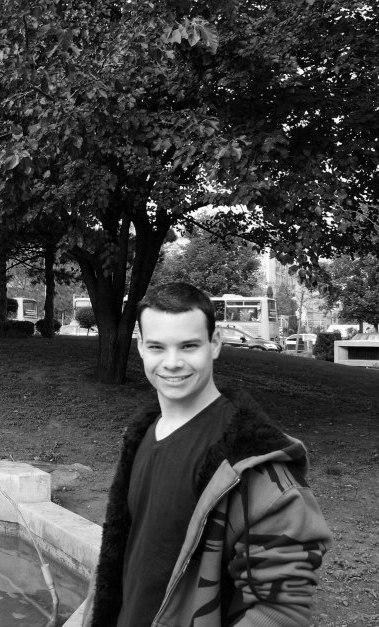
Bruno Zeitel
Home university: University of Florida, USA
Host university: University College
Utrecht
Maarten Broekhof
Home university: University College Utrecht
Host Universityuniversity: of New Hampshire, USA
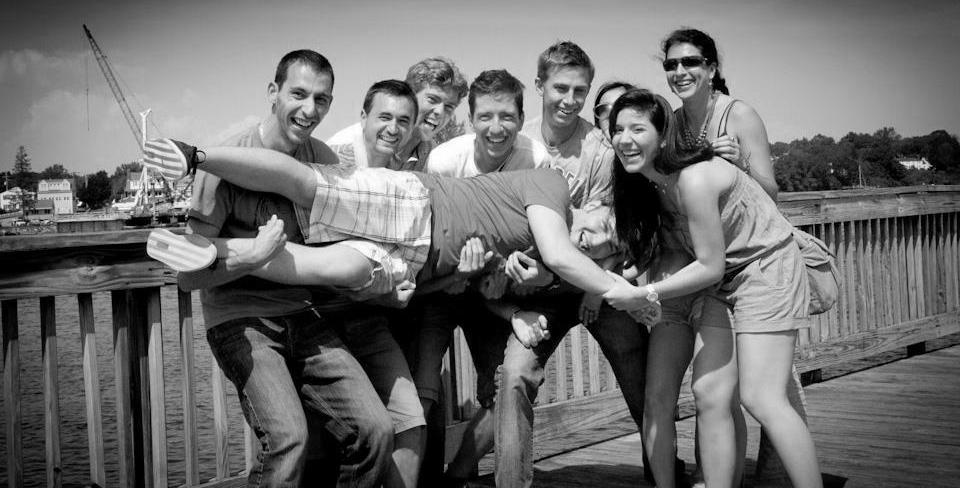

One of the first questions Americans will ask when you arrive to their country is whether it is your first time in the States. When you answer that you visited New York before, they respond: “So you haven’t been to the States, you’ve been to New York - that is an entirely different thing”. I have been living in New Hampshire for two months now, and have met many Americans from many different places, and I have realized that you cannot generalize the American population into one monolithic group. Therefore, I will restrict to giving some insights into the life among New Hampshireans, and college life in this part of the States.

The University of New Hampshire (UNH) advertises itself with the notion that “it’s only an hour away from Boston”. Even though it is true that university town Durham is very small and not very close to any big cities, UNH does give you one of the best experiences of genuine American campus life. As opposed to California for example, almost every student in New Hampshire is American, most hailing from New Hampshire or a neighboring state. Without exception, the Americans I have met have been very friendly and open,
and are interested to hear ‘why on earth?’ I picked UNH as an exchange destination.


One important difference with UCU is that most people here live with roommates. In my case this worked out very well: living with two roommates is an interesting experience and made it easy for me to meet new people. As most of my friends here are sophomores, it was possible for me to attend some nice parties and even to gain entry to a frat party, which requires you to be ‘on the list’. I can tell you, frat parties are definitely a phenomenon you should try to experience once if you are on exchange in the States, (to never go to one again, but hey, that one time is a necessity!). That, combined with the nice cities and villages that are all within easy reach by train or bus, the beautiful nature of the area and the whole experience of living abroad for half a year all contribute to my conviction that if you have the option you should definitely go on exchange. And you should most definitely consider going to the amazing University of New Hampshire!

You go to class every morning, you eat in Dining Hall, you party at the bar. And you think all this is real. But is it really?
After all, all you know about DH food is that you taste it (and maybe you’re not so pleased). You also see it, smell it, touch it. In other words, what you know is that your senses perceive it. But try to think. Does this mean that DH food is really there? What if there was an evil genius who has taken our brain, placed it in a pool and bombed it with all sorts of perceptions from the real world? It could be that everything around you does not actually exist, you just think it does.
Maybe you are pleased if this was the case with DH food, but if the same reasoning extends to your play-station, your girlfriend, your own body and, worst of all, your Little Brown Handbook, that would be a real tragedy. In fact, the whole world around you would then only be an illusion, and you would be nothing more than a brain bombarded with images, tastes, smells –things that you think are there, but in fact are not.
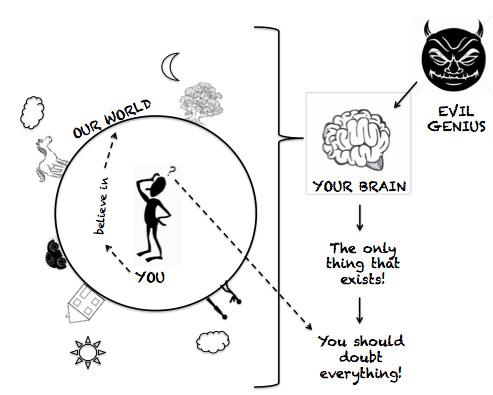
This idea of the brain in a pool was first formulated by French philosopher René Descartes
in his Meditations on First Philosophy (1641). Descartes said that, since we cannot be absolutely certain of any of the things we sense, we should doubt everything around us, unless we can prove it with absolute certainty.
You may think it’s just a senseless speculation. Of course our world exists. But if I asked you how you can be so sure, you’d probably have a hard time answering. The fact is that, while many thinkers tried to counter Descartes “methodological doubt”, nobody convincingly succeeded to show why his supposition of a malin génie (an evil genius creating the illusion of the world in which we live) would be impossible. Since it is a possibility (even if a very unlikely one) we do have a reason to doubt everything.
A tragic conclusion? Well, it depends. Next time you get a D for your Macroeconomics exam, there is at least the possibility that it is not real. Maybe you just think it is.
Pasta is just the hungry student’s best friend. So easy to prepare! But are you getting bored with that tomato sauce or the little jars of AH pesto? Here’s a fresh idea for you: pasta with yummy avocado sauce.
First hop on a bike and go get these:
-a pack of pasta (we like using wholewheat spaghetti from the health food store next to the second AH)
-two avocados (the riper the better)
-one garlic (or less, depends how much you like garlic)
-one lemon
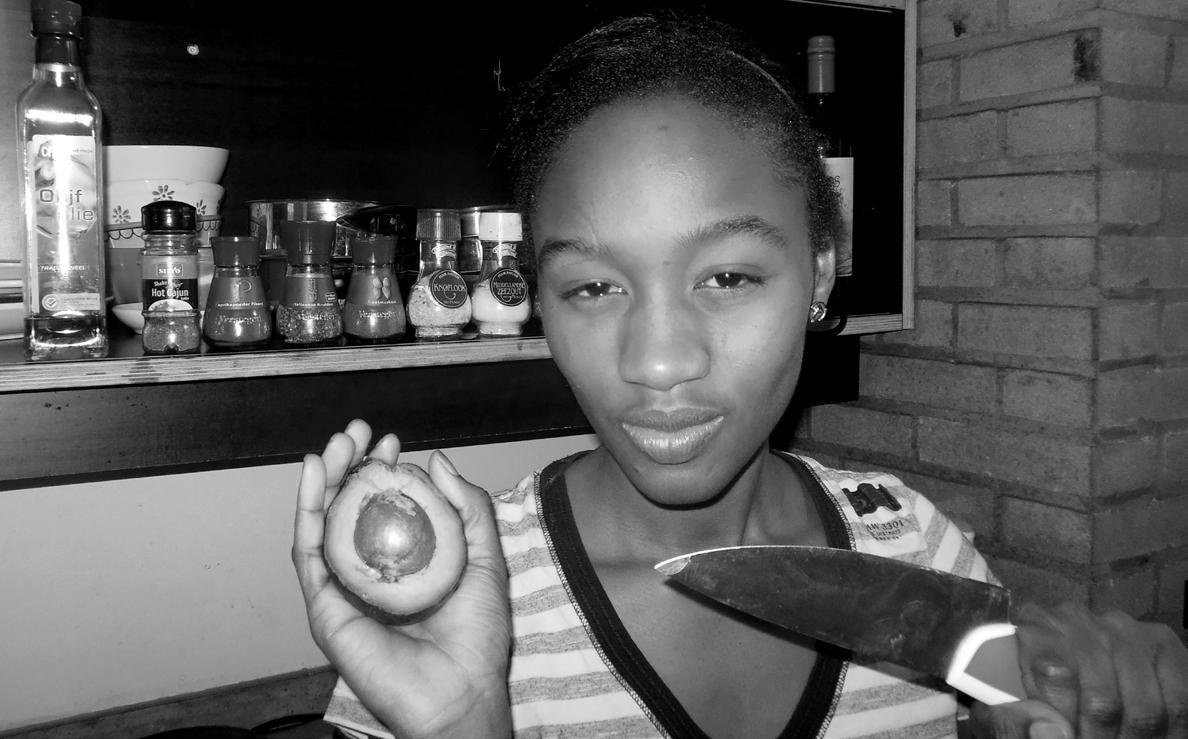
-basil or mint (better when fresh, can also be found in this store.. or in the EWG garden??)
-some parmesan
-olive oil
-sea salt
Then the fun begins:
Boil the pasta (Tips: add the salt in the water, during boiling. Add some olive oil to prevent it from sticking together). Meanwhile scoop the avocados and chop the garlic and basil leaves veery finely. Then mix them all together and add some olive oil and lemon juice squeezed from the one lemon. Mix and mash everything with a fork. Using a blender would be ideal, but if you do it long enough with a fork and comes out great.
Use your sauce on the pasta and top with parmesan. Gather your unitmates and dig in! Enjoy!
The regular readers of Zog Journal of the Social Sciences might be familiar that our team of social scientists have been conducting intensive (and extensive) research in the town of Utrecht on planet Earth. Research has centred on a social activity around a collection of buildings called University College Utrecht (UCU). Disguised as an earth “fly”, our team has now made fascinating discoveries regarding the traditions and rituals of the inhabitants: particularly a ritual known as “Course Selection”.
The yearly ritual starts at approximately the hottest time of the year. For this reason we believe its roots may lie in an ancient sun worshipping festival. The tradition is perhaps a form of “rite of passage” for the young, newly-arrived humans. These new apprentices consume large amounts of liquid and listen to loud music. They perform strange and incoherent dances, often falling down in a religious “trance”. At the end of this earth week of worship they spend an extended night in bed and the next day appear very sad and uncommunicative. We speculate this to be a form of mourning for the lost summer heat.
At the next stage each apprentice consults an assigned priest called “Tutor”. The manifest purpose of this consultation seems to be to assign each apprentice to “Courses”. These “Courses” are extension of the rituals the apprentices have experienced at a younger age in other villages.
In our detailed and very scientific observa-

tions, we reveal that the way the apprentices are assigned to these ‘Courses’ seems to be somewhat random.
The priest or ‘Tutor’ makes reassuring noises to the assigned apprentices that they will be assigned to the Courses they have chosen. Happy and content, the apprentices get involved in other strange rituals that seem to have no manifest purpose: buying a mechanical two-wheel device, finding out where and what the O:\ drive is (and then wondering why they bothered), trying to work out on which web site their newly created passwords work (on most it stays as gobbledegook), ordering and paying for books at ‘Study Store’ afterwards revealed to be out of stock, trying to print documents for which he needs a CHIP card for which he needs a Dutch “bank account” for which he needs a BSN number for which he needs to register with the great metropolis of Utrecht - for which he needs to wait until 14 September.
While the apprentices are busy with these rituals the Tutors construct a “Waiting List”. We believe it has the latent function of re-assuring the apprentices that all will be well and that the sun will come back to full heat next year. Despite detailed investigation we can’t find a manifest purpose for the Waiting List.
Many more questions remain unanswered about this fascinating village. A popular area of interest is the communal feasting area called “Dining Hall”. Since recently, apprentices have started carrying plastic cards to the hall – is this some form of sacrifice? What are the latent and manifest functions of such cards? Why do apprentices no longer visit the hall at the start of the day? These are all complete mysteries.
“It could be that everything around you does not actually exist, you just think it does”
Big cities like Amsterdam have a lot to offer. But they also involve cheap tourist attractions, masses of people and clamour. The city of Haarlem is a great alternative to the hectic rush of metropolises.
A quick look at a map seems to show that Haarlem is a seaport. Although the city does border on the coastal dunes of the ZuidKennemerland National Park, you cannot access the sea from the city. Early November is not a good time to visit Dutch beaches anyways, so let’s take a look at what the town itself has to offer.
Thrill-seekers will say “not much”. Haarlem is a sleepy place and if you are looking for action and adrenaline, you might want to hop off at Amsterdam Centraal. However, if you are tired of Amsterdam’s sights, weed stench, and tourist crowds, Haarlem invites you to stroll around its beautiful streets and enjoy the calm atmosphere.
Haarlem is full of ornamented buildings and impressive churches. The Grote Markt is most outstanding; you can easily reach it by heading out of the train station and following the road straight ahead (as you can see, getting around Haarlem is not too difficult). In the centre of the Grote Markt looms the Grote Kerk with its iconic bell tower, surrounded by a bunch of cafés. Check out the massive and famous pipe organ inside.
Apart from the magnificent architecture all over the city centre, Haarlem has a number of interesting museums. The Frans Hals Museum features Dutch masters, but unless you are an art history major, you might consider it a bit pricey. A better choice is the Teylers museum, the oldest museum of the Netherlands. Not only does it exhibit art, the Teylers also features natural history and science. The building itself is worth a visit and inside you will find old, badass scientific apparatuses, fossils, paintings, and stones. Stones! Can you believe that?!
If I would have to describe Haarlem in one word, it would be ‘picturesque’. It is a quiet place and there is not much to do, yet the town’s beauty makes a short day trip worthwhile.
Costs: 20€ for a full-fare return ticket
Travel time: ca. 45min one way (transfer once, at Amsterdam Centraal)
Teylers Museum
Location: Spaarne 16, Haarlem
Opening times: Tue-Sat 10am-5pm, Sun 12am-5pm, closed on Mondays
Careful: Even with a Museum Card, you have to pay an extra 5€ for entrance, due to their Raphael exhibition.
Januschka VeldstraFew things in life are cooler than being able to say you are a writer. Even fewer things are cooler than being able to back up that claim with at least one novel. Enter NaNoWriMo.
National Novel Writing Month is an annual, month-long writing adventure. Wrimos – NaNoWriMo participants – start at twelve sharp on the 1st, to finish no later than just before the clock strikes midnight on the 30th of November. By that time, they should have written at least fifty thousand words of anything ranging from prose to perfectly unintelligible crap. If you did manage to make it to 50.000, you win; your prize is eternal glory, and a novel roughly the size of ‘The Great Gatsby’.
One of the most important things to do for winning is switching off your inner editor: The voice in the back of your head telling you maybe you should use a different word, or switch around those sentences, or put in more adjectives, or fewer. The inner editor is every wrimo’s worst nightmare; it’s what kept you from starting in the first place, and
it’s determined to keep you from succeeding now. So, naturally, you visualise a little box with a big lock in your mind and stuff that editor in there for the time being.
However, sometimes your inner editor has a point. Maybe when you are writing at top speed the quality of what you create suffers. Throwing everything that crosses your mind onto a screen you feel forever holds too few words. To win does not guarantee the next ‘War and Peace’. Fortunately, that is entirely beside the point! The point is to finally do what so many dream of, and so few actually accomplish: Writing a book.
The best thing is not that you will be able to send off your manuscript to a publisher on December 1st; the best thing is that you will surprise yourself with your inventiveness, persistence and general awesomeness. You may find yourself crying bitter tears of frustration along the way, but if you manage to keep going until you win, you are on top of the world. And then there is always time to edit your work and maybe become the next Rowling, Dostoyevsky, or Fitzgerald.
Planning on becoming a more-or-less established writer? Check out www.nanowrimo. org for more information and a great wealth of fun procrastination material, and add me (Jnusch) as a writing buddy!

Debates on what defines independent film have been raging for years as the latter’s popularity has risen. Two key features have still remained steadfast characteristics of independent cinema: aesthetic form and the mode of production. Independent films are produced on a low budget and usually have a distinct style through which the director reveals his or her artistic vision.
The birth of independent film can be traced back to France with the development of New Wave film, a reaction to the encroaching dominance of American cinema in Europe. Its members focused upon the nature of cinema as an artistic practice. This movement had a profound impact on the Western world and affected cinema from the 1960s onwards. The mode of production now used in contemporary independent film-making vastly differs from previous methods due to the growth of modern technology: in particular the development of affordable digital cinematography cameras and computer editing software. Francis Ford Coppola said that cinema is “escaping being controlled by the financier, and that’s a wonderful thing. You don’t have to go hat-in-hand to some film distributor and say, ‘Please will you let me make a movie?”. Power is now slipping

from the fingers of the major film studios and falling into the hands of the independent director.
The growing interest in film festivals such as the internationally acclaimed Sundance Film Festival has resulted in a wider audience for the previously niche market that independent film was aimed for. A fantastic example of the success of independent film is ‘Waltz with Bashir’, written and directed by Ari Folman. It is a poignant and personal war documentary which depicts Folman, an Israeli veteran of the 1982 Lebanon war, trying to uncover his lost memories. The subject matter of the film combined with the medium of animation, styled upon graphic novels, lays bare the harrowing futility of war, creating an innovative documentary. After its premiere at the 2008 Cannes film festival, the film shot to fame winning multiple awards including a Golden Globe. Films such as ‘Waltz with Bashir’ which handle significant subject matter pull independent cinema into the limelight as a method of artistic expression. The transformative power of independent cinema results in a creative energy between cinema and its cultural environment as it interacts with social change. It plays a key role in the growing view on cinema as integral in culture.
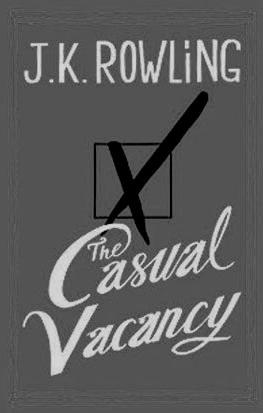 Ivo Dimitrov
Ivo Dimitrov
What do you do if you are among the world’s best-selling authors? In J. K. Rowling’s case, you follow up your immensely popular bestsellers with a book with a directly opposite approach. Gone are the wizards in her latest novel, only to be replaced by local politics and small-town life in ‘The Casual Vacancy’.
The novel tells the story of a seemingly peaceful English town called Pagford, where all is well until the sudden death of a councilman. The resulting local council election soon affects many of Pagford’s inhabitants. By constantly shifting the point of view, Rowling describes broken families and desperate teenagers, narcissistic individuals and clashing social classes, as the fight over the election escalates further and further.
‘The Casual Vacancy’ is surprisingly grim and pessimistic in its look on contemporary
English society. No one is a hero, as every single character’s existence is rooted in an obsession with their own daily life. This selfcentered look and the lack of mutual understanding ultimately lead to the question: To what extent are we responsible for our own lives and for each other? In highlighting this, the novel does not shy away from addressing explicit social issues, such as racism, rape, abuse and suicide. This might sound shocking coming from the woman who gave us Quidditch and butter beer, but Rowling’s work has always had a strong undertone of social injustice; this merely intensifies here. Combine this dark nature with tight plotting, complex characterization and memorable descriptions and you get an engaging and touching read. It is an ambitious work that shows an author aware of her strengths but willing to venture into new territories. In the end, Harry Potter fans need not fear: Rowling has not lost the magic touch –she has merely grown.
Magnetron Revue: De Jeugd Van Tegenwoordig/ Aka The Junkies/ Le Le/ and many more/
November 8
 Omri Preiss
Omri Preiss
The recent death of Gore Vidal was the loss of an icon, among the last of rare breed of thinkers - no less. At a time when so much of our political discourse has deteriorated to driveling gibberish, Vidal’s passing is a dear opportunity for reflection.
“One of the most salient features of our culture,” the philosopher Harry Frankfurt wrote, is that “there is so much bullshit,” and that we “tend to take the situation for granted.” And if most of us look around us, and click a little around our virtual worlds, we would instinctively agree. Setting aside the ‘Theory of Buillshit’ (google it), this momentary lucid realization is perhaps what makes the life and works of Gore Vidal so potent and poignant.
As a political commentator and polemicist, a man who seems to have lived and breathed politics, Vidal had an unmatched wit, sharp as a blade, able to articulate through comic quip or scholarly argumentation ideas that would cut through bullshit with merciless laser precision. A fearsome colossal intellect, wrapped in the humour of a goodhearted cynic, Vidal did not tolerate fools, foolishness, mediocrity, and hypocrisy, and many of his pronouncements will live on long after him.
In many senses, Vidal, a lifelong Democrat (famously closely connected with the Kennedys), was among the last of a breed of true republicans, in the true sense of the word – as a proponent and researcher of the establishment of the Republic of the United States. His painstakingly detailed exploration of 19th century American politics in his historical novels illustrate a rare touch for nuances, as the appreciation and reference to ancient Greece and Rome. Such profound allusions to the historical roots of Western politics, in order to throw light on the inadequacies of both past and present, is something that our current impoverished political deliberations often lacks.
The sexual (and gender) revolution that took place in the 1960s and 70s owes something to Vidal, who was among the first to present homosexual and transsexual relationships in novels blatantly, such as ‘Myra Berckenridge’, that provoked vehement conservative denouncements as ‘perversion’ and ‘pornography’, which Vidal gracefully deflected. Vidal proclaimed that “there is no such thing as a homosexual or heterosexual person, there are only homo- or heterosexual acts. Most people are a collection of impulses if not practices.” As such he never identified himself as gay or bisexual, claiming that human beings are too complex to be reduced to their sexual preferences. His work has surely contributed much to our changing perceptions of gender and sexuality, as a landmark in gender and queer theory.
It is somehow fitting that Gore Vidal passed away this last July, as
the US presidential contest began to gear up to climax. As has become the norm, it is money over matter, and much depends on the manufacturing of alternate realities – fabrications that insult intelligence. Surely, if Romney were to win the elections, Vidal would have wanted to get off of this planet (as would most of us, who hope it will not come to that). Regardless of the election outcome, his voice in American and world politics will be sorely missed.
When asked how he would like to be remembered, Vidal responded “not at all.” But it is emphatically important that he is. If anything, his legacy is one of ever-discerning intellectual pursuit of nuance, of questioning norms, and of not taking the establishment, or humanity’s buffooneries generally, all too seriously. These habits we would do well to encourage in these harrowing times.
Tivoli
Want to know what Dutch electro-funk and hip hop sound like?
Check out De Jeugd van Tegenwoordig, Lele, Aka the Junkies, Rimer London and many more in Tivoli. If you’re an international student, these big names of the Dutch music scene might not mean anything to you, but it’s time they should! Seize your chance and bring Dutch friends to explain the lyrics. It’ll be fun...
[Check out on YouTube: LeleNeen + English version Lele - No]
Smartlappenfestival:
Traditional Dutch Music Festival
November 16-18
Utrecht
Be prepared when entering any of Utrecht’s cafés this one weekend in November: ‘Smartlappen’ might be performed in there. If you are unfamiliar with this end of the Dutch music spectrum, these Schlager-like songs about life, love and suffering might startle you. Still, they do have a charm not to be ignored. So buy a beer and give it a try!
[Check out on YouTube: André Hazes – Zij gelooft in mij]
High Times International Cannabiscup 25th edition
November 19-22 Amsterdam
Interested in that part of Dutch culture? Then the Cannabiscup might catch your attention. This event, founded in 1987, allows marijuana cultivators from around the world to put their brands up for competition. You could be part of a set of international judges which decide on winners in quality and more. The event also includes art exhibitions, lectures, comedy and live music – perhaps a subculture worth exploring?
Ouwehands Park van Sint: Park of Sinterklaas
November 18, 24 and 25, December 1 and 2 Rhenen
Sinterklaas and his helpers are going to visit the zoo in Rhenen! Whether you are unfamiliar with the famous Dutch holiday Sinterklaas or have celebrated it since birth, this is your chance to check out penguins and Pieten in one place. Go and catch some pepernoten. Or feed them to the giraffes, if you prefer.
2nd
“I would go to work in my underwear”
“Give a ‘select group of people’ an oven”

“Get to know the students on the quad”
“Go to the bar and get drunk with the students!”
“Build a statue of UCU founder Hans Adriaansens on the quad”
“Through a competition like the Hunger Games and whoever wins gets unlimited Dining Hall credit”
“Start a freestyle rap battle”
Editors
Sofia Banzhoff
Laura Boerboom
Lisa ten Brinke
Elena Butti
Willem van Geel
Marina Lazëri
Klementina Ristovska
Robert van Schaik
Januschka Veldstra
“Ban physics exams”
“Ride on the iceacream bike and give out free icecream”
The Boomerang Team 2012|2013:
Editor-in-Chief Klementina Ristovska
Managing Director Elena Butti
Off-Campus Editor & Secretary Marina Lazëri


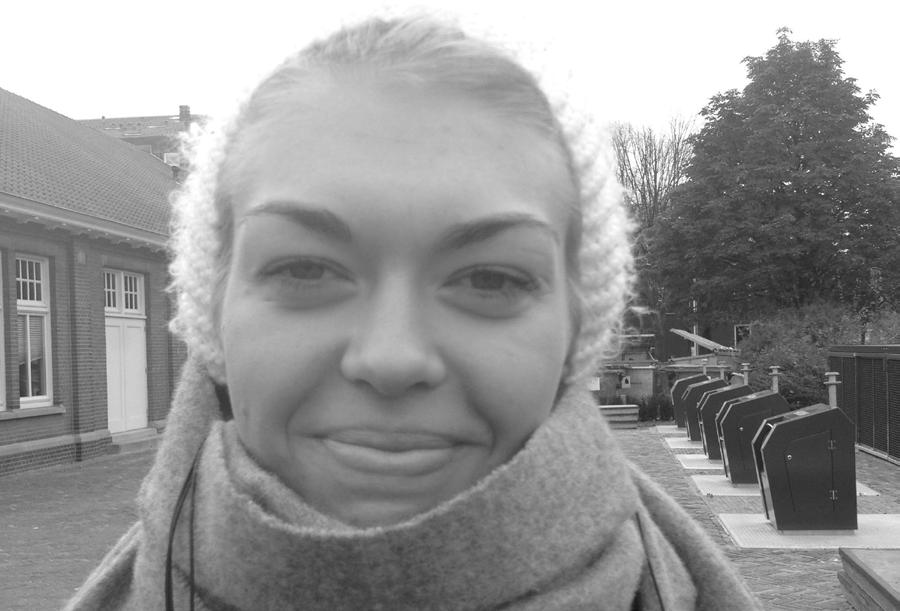
Campus Editor & Treasurer Willem van Geel
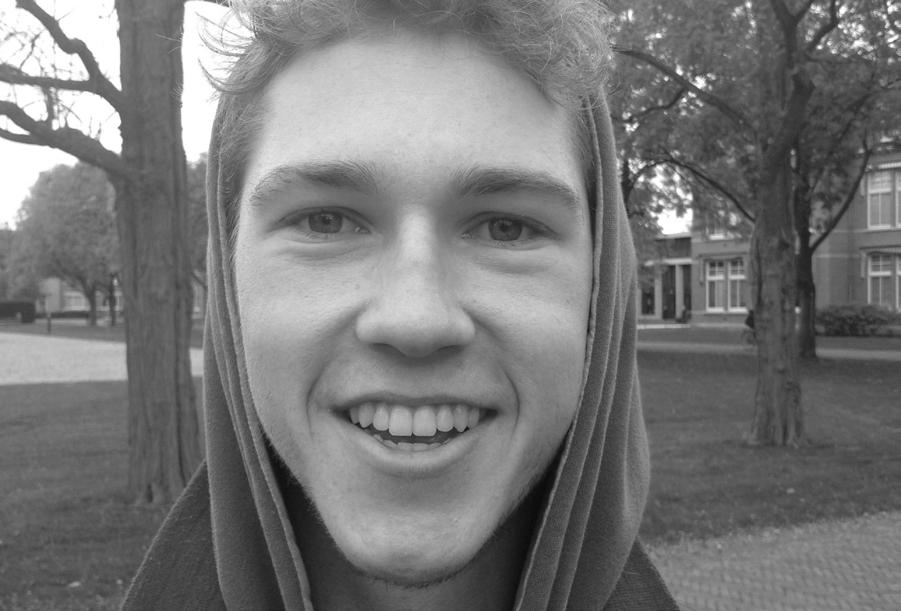
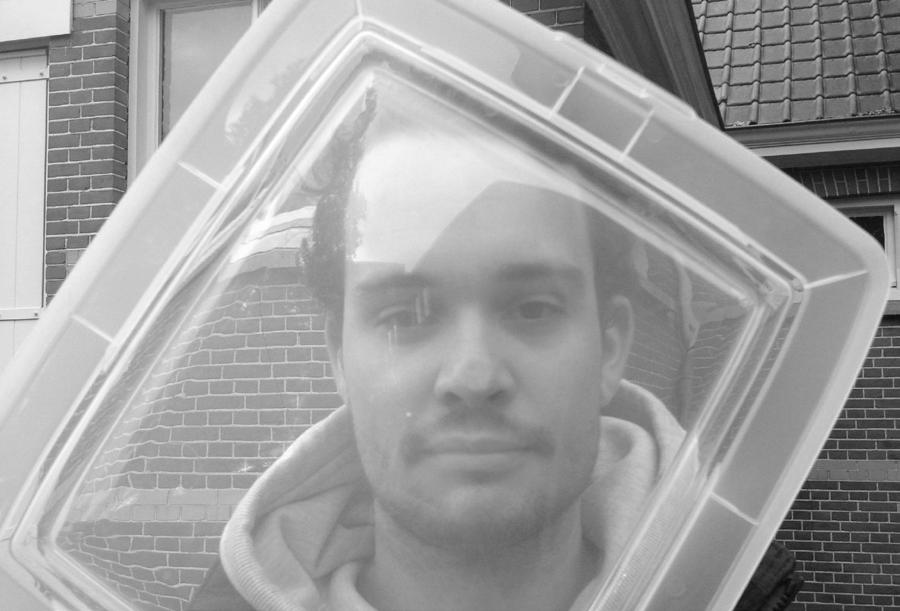
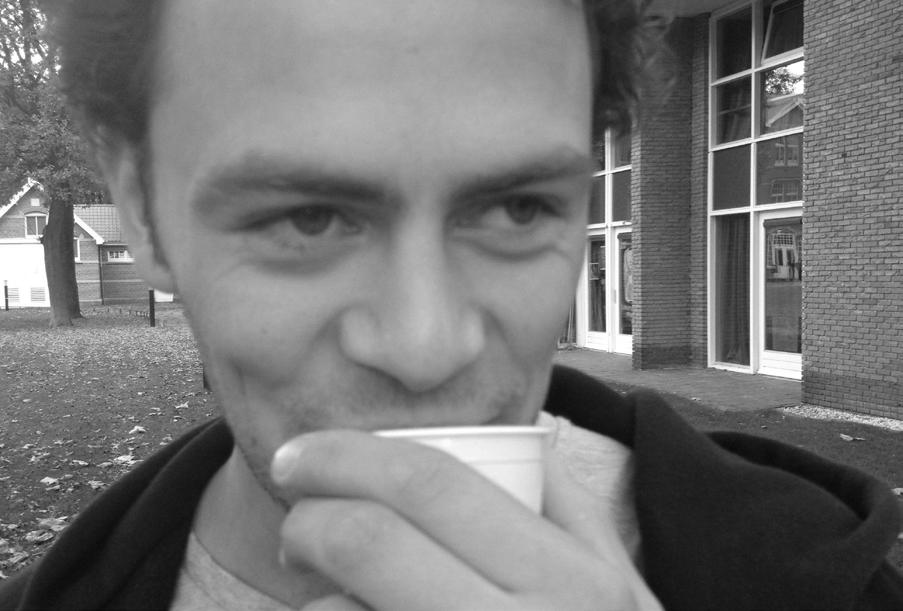
Managing Editor Laura Boerboom


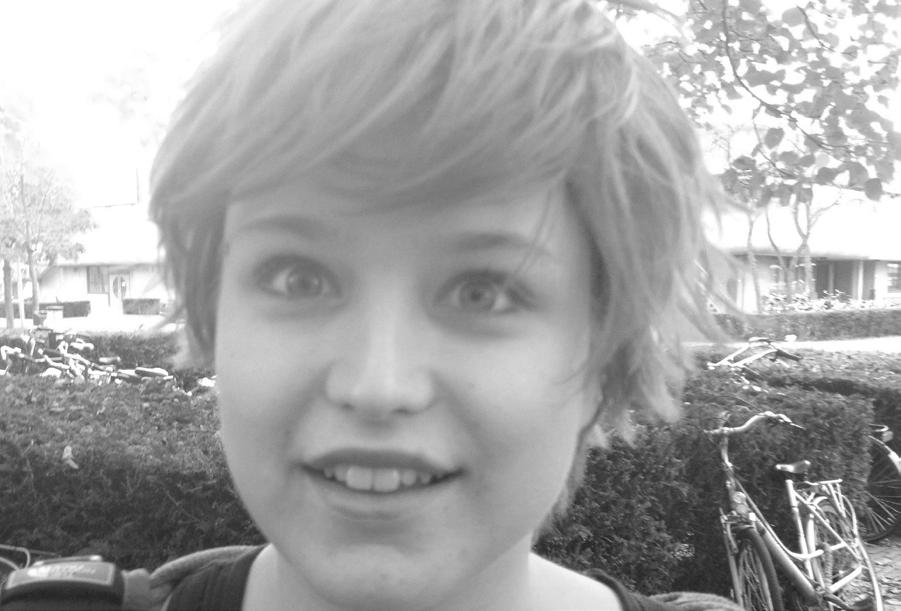
Art and Layout Director Minh Tue Le Ngoc
Layout Designers Emiel Stegeman, Danielle Bovenberg
Cartoonists Carlos Granados Martínez, Laurence Herfs
CAO Martijn Scholtemeijer